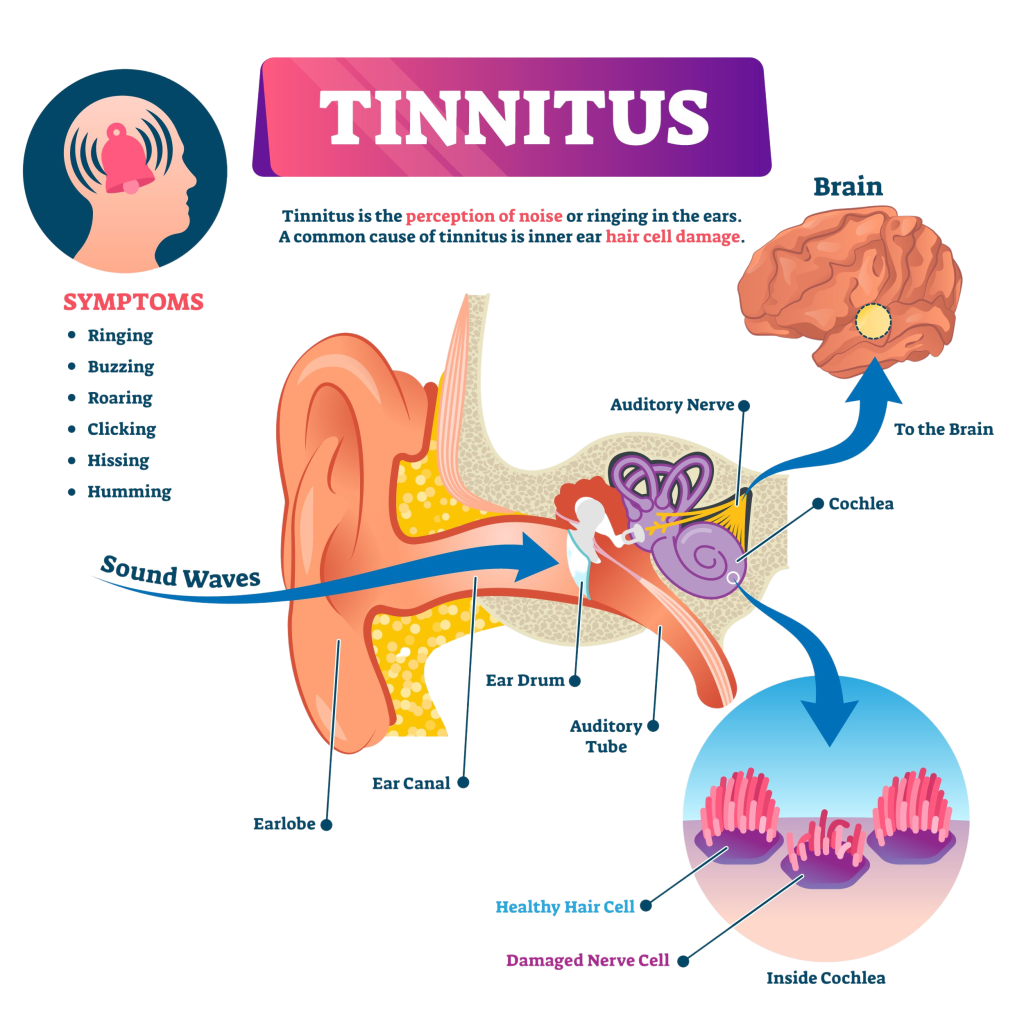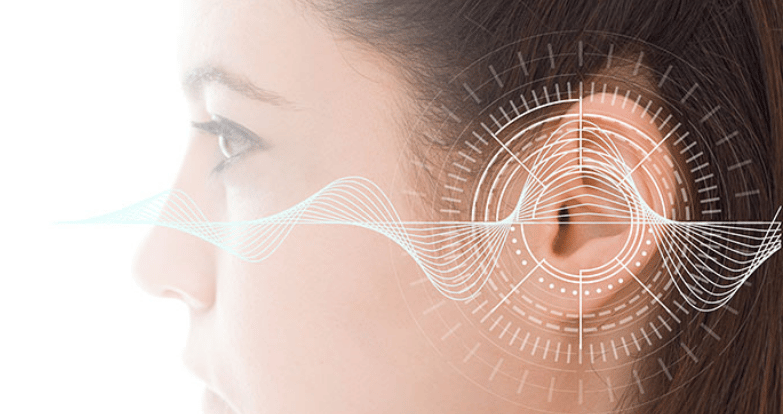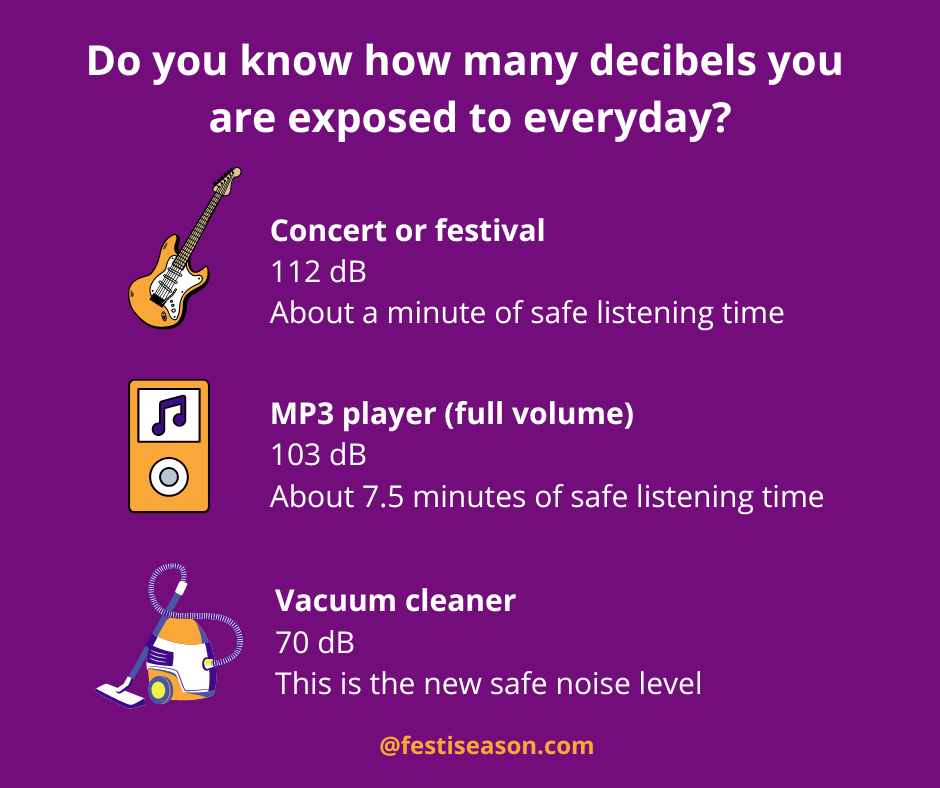Do you recognise the annoying buzzing in your ears after a concert or festival? That is a sign that your ears have been exposed to noise that is too loud (for too long). Wearing good hearing protection is increasingly being brought to people’s attention, and rightfully so. In fact, the number of young people who suffer tinnitus after attending a concert or festival has never been higher. In this blog, read more about exactly what tinnitus is, what causes it and how to prevent it.
On this page:
What is ‘tinnitus’ in simple words?
Tinnitus is also known as ringing in the ears or ear buzzing. The name comes from the Latin “tinnitus aurium”, which means “ringing of the ears”. About 750 million people worldwide are affected by tinnitus, according to research in the journal JAMA Neurology. If you suffer from tinnitus, you continuously hear a sound in your head. Most of the people hear a sound that is not there in reality (subjective tinnitus), so only you can hear it and no one else. This continuous sound can recur in fits and starts, but it can also be non-stop if you are unlucky.
Does tinnitus come from the ear or brain?
Initially, the assumption was that the cause of tinnitus lay in the hearing organ itself. But the causes are more likely to be found in the brain. Overactive parts of the brain in the area of hearing continuously signal while the sound is off. Also the nerve cells take care of hearing.
Other possible causes include abnormalities of blood vessels, ossicles or of the inner ear. Another common cause of tinnitus is inner ear hair cell damage. Unfortunately, tinnitus can lead to numerous serious consequences, such as sleep problems, insomnia, loss of concentration, headaches, memory problems, anxiety or even depression.

How do I recognise tinnitus or ‘ringing in the ears’?
There are different names for tinnitus: ringing in the ears, ear buzzing and so on. After all, everyone experiences tinnitus in a different individual way. You can hear sounds like rustling, squeaking or whistling in high or low tones. Some people hear this buzzing louder or softer than others. Sometimes people hear it in one ear; others hear it in both ears. Also, these sounds may be intermittent or continuous.
It rarely happens, but tinnitus can also occur as a rhythmic pulsing, in time with your heartbeat (pulsatile tinnitus). When your doctor does an examination, he or she probably can hear your (objective) tinnitus.
Do you experience hearing loss or are you experiencing anxiety or depression as a result of your tinnitus? Then please go and see your doctor.
Symptoms of tinnitus:
- Ringing
- Buzzing
- Roaring
- Clicking
- Hissing
- Humming
Take a look at the video below to experience different types of tinnitus:
Who gets a ringing in the ears?
Despite the fact that anyone can get tinnitus, including young children, it is more common in people aged over 65. A common cause of ear buzzing, therefore, is age-related. Yet more and more young people are getting tinnitus. According to House of Hearing, tinnitus is developing fastest in young people. This shouldn’t come as a surprise, since young people and teenagers are known for going to a lot of concerts, clubs and festivals. In most cases, the exact cause is never found.
The most common causes of tinnitus are:
- Parental deafness
- Certain medications
- Noise damage from concerts or festivals
Other less common causes of tinnitus include:
- Head or neck injuries
- Ear infection
- Meniere’s disease
- Chronic conditions such as diabetes, migraines, lupus.
Of course there are other factors that may increase your risk of getting tinnitus. The most common and risky factor is exposure to loud noise. Loud noise is increasingly common as a cause of tinnitus, especially among young people. Also tobacco and alcohol use have been associated with tinnitus.

Can concers or festivals damage your hearring?
The hearing loss that may be experienced after a concert or festival is not generally believed to be permanent. The ear buzzing usually disappears within 48 hours. So most people who attend a festival experience temporary tinnitus. However, repeated exposures to the same level of loud noise may cause permanent damage, resulting in hearing damage.
Tip: download the free app Sound Meter. With this app you can determine the noise level easily.
A study conducted by House Research Institute (HRI) proved that 72% of the teenagers participating in an experiment visiting a pop rock concert experienced temporary reduced hearing ability. Moreover, any sound over 85 decibels can cause hearing loss. The louder the sound, the faster the hearing loss will occur. And as most may know, at any concert or festival, the decibels are many times higher, starting at 100 decibels. Listening to noise above 100 decibels for only a minute without hearing protection can cause hearing damage.
‘Attending a Concert Caused 72% of Study’s Teenagers to Experience Reduced Hearing Ability’
House Research Institute (HRI)
Do you know how many decibels you are exposed to?

What helps tinnitus go away?
The way to treat tinnitus depends mainly on whether you got it from underlying health issues. In some cases changing your medication will reduce or stop the tinnitus. Also, your doctor may be able to reduce the symptoms by removing an earwax blockage. Unfortunately, there is no cure for tinnitus. However, there are fortunately a number of ways you can make tinnitus more bearable.
Over time, people can go through a process called habituation where the brain can tune out the sound of non-essential stimuli, like tinnitus. Another way to help make your symptoms less noticeable is by using a white noise machine. This type of device produces a similar sound to static, or environmental sounds (rain, ocean waves). Fans and air conditioners also make the bedroom produce white noise.
Tip: there are also pillows available these days that contain speakers that help you fall asleep.
How can I prevent hearing damage at a festival or concert?
The most obvious way to prevent hearing damage at a festival is to wear hearing protection. According to a study in the Canadian Journal of Public Health, hearing protection is currently not worn by most attendees of rock concerts who are at risk of developing noise-induced hearing loss (NIHL). About 80% of the attendees of a rock concert in this experiment said that they never wore hearing protection at concerts or festivals.
Terrible shame! Once hearing damage is done, it cannot be reversed. So purchase decent music earplugs. In addition, it is advised to limit alcohol, caffeine and nicotine, as these can affect blood flow and contribute to tinnitus. Another precaution that can help prevent hearing damage is to take care of your cardiovascular health. Eat healthy and exercise regularly to keep your blood vessels healthy.
Protect my babies hearing during a festival
Young children and even babies can also suffer hearing damage at a festival. While it is not recommended that you bring your baby to a concert or festival anyway, if you do bring your young child, at least make sure you have safe hearing protection.

There are a lot of headphones for kids on the market these days so they too can enjoy a festival experience with their parents (without suffering hearing damage). Check out our picks below.
Lunobaby Baby Ear Muff (also for airplane travel)

Are you someone who developed tinnitus after a festival? How do you deal with it? And do you have any tips for others experiencing tinnitus? Please share your experience or recommendations in the comments below to help others.
Sources
Mayoclinic
The Hearing Review
McCormack, A., Edmondson-Jones, M., Somerset, S., & Hall, D. (2016). A systematic review of the reporting of tinnitus prevalence and severity. Hearing Research, 337, 70–79. https://doi.org/10.1016/j.heares.2016.05.009
Bogoch, I. & House, Ronald & Kudla, Irena. (2005). Perceptions About Hearing Protection and Noise-induced Hearing Loss of Attendees of Rock Concerts. Canadian journal of public health. Revue canadienne de santé publique. 96. 69-72. 10.1007/BF03404022.


